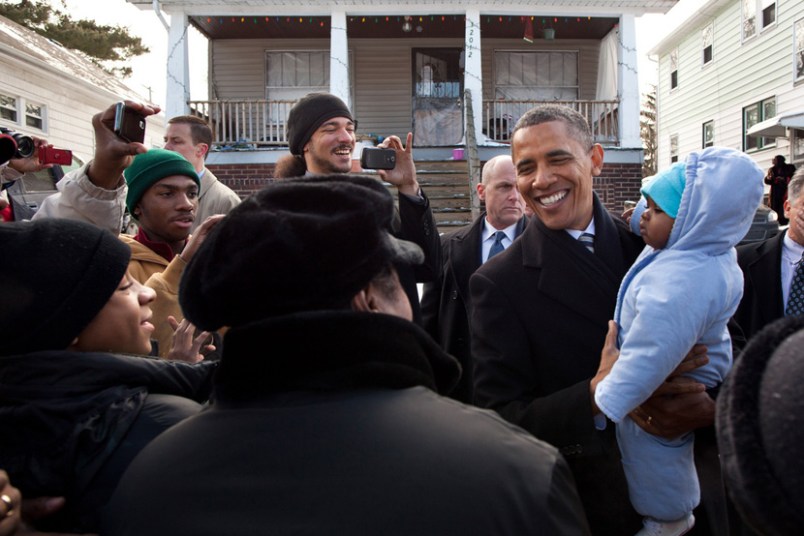President Obama, often accused by critics of being cold and aloof, was anything but when asked about the shooting death of 17-year-old Trayvon Martin on Friday morning.
“If I had a son, he’d look like Trayvon,” Obama said, applying a deeply personal touch to a story that has generated national outrage. “And I think they are right to expect that all of us as Americans are going to take this with the seriousness it deserves and that we’re going to get to the bottom of exactly what happened.”
Obama may not have Bill Clinton’s famed reputation for empathy, but at this point in his presidency, it’s clear that he has his own brand of earnest reflection that he’s demonstrated over the last several years. One method he’s used frequently to connect with voters: taking a big national story and framing it in terms of his own family experience. Time and time again, Obama harnesses his reputation as a devoted dad and husband to react as both president and Father-In-Chief.
The Trayvon Martin case is not the only instance in which he’s invoked his children this month. He brought them up in explaining his decision to call Georgetown law student Sandra Fluke to offer encouragement in the face of a massive smear campaign led by Rush Limbaugh.
“The reason I called Ms. Fluke is because I thought about Malia and Sasha,” Obama said at a March 6 press conference. “And one of the things I want them to do as they get older is to engage in issues they care about; even ones I may not agree with them on. I want them to be able to speak their mind in a civil and thoughtful way. And I don’t want them attacked or — or called horrible names because they’re being good citizens.”
Earlier this year, he offered up his sympathies as a parent to the father of Jessica Buchanan, who was held for three months by Somali pirates before being rescued by Navy SEALS.
“I cannot imagine what he went through — given Malia and Sasha — and for him to be able to stay strong and then for our incredible men and women in uniform to do what they do, it makes you proud about this country,” Obama said in an interview with ABC’s Diane Sawyer.
Obama’s recent campaign documentary, “The Road We’ve Traveled,” prominently included images of Malia and Sasha during a section highlighting the Lilly Ledbetter Fair Pay Restoration Act. Obama said during his signing ceremony that the bill was “for my daughters,” and the film used audio of him saying the bill would help “ensure that our daughters have the same rights, the same chances, and the same freedom to pursue their dreams as our sons.” The film, more controversially, also made heavy use of Obama’s mother and her struggle against cancer to explain the president’s support for health care reform, citing her difficulties finding proper insurance coverage.
If there’s a theme here, perhaps Obama expressed it best himself in his eulogy to the victims of the 2011 Arizona shooting:
For those who were harmed, those who were killed — they are part of our family, an American family 300 million strong. We may not have known them personally, but surely we see ourselves in them. In George and Dot, in Dorwan and Mavy, we sense the abiding love we have for our own husbands, our own wives, our own life partners. Phyllis — she’s our mom or our grandma; Gabe our brother or son. In Judge Roll, we recognize not only a man who prized his family and doing his job well, but also a man who embodied America’s fidelity to the law.









